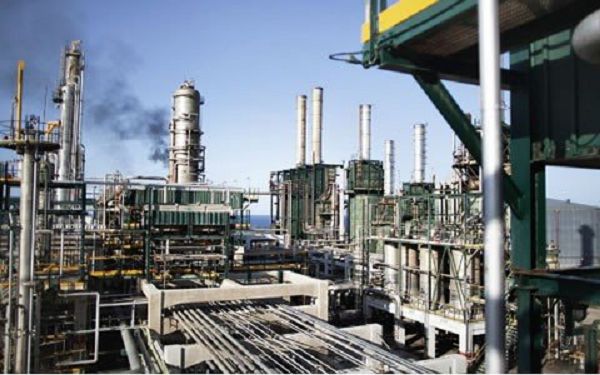
TOR bounces back - Refining of crude oil resumes next week
The Tema Oil Refinery (TOR) has revived its refinery business to provide petroleum products such as diesel and liquefied petroleum gas (LPG) for the domestic and sub-regional market, after four years of intermittent tolling of crude oil for third parties.
The refinery is due to resume the processing of crude oil into finished products next week, after taking delivery of 947,000 barrels of crude oil over the weekend.
It followed the signing of a crude oil supply deal with BP Oil International, a British oil trader.
Arrival
The Managing Director of TOR, Mr Isaac Osei, told the Daily Graphic in Accra that the first consignment of 947,000 barrels of crude arrived last Friday on board the MT British Heritage.
The oil has since been transferred into TOR’s storage tanks to undergo pre-refinery procedures before it is fed into a distillation column for actual refining to begin.
“In the coming week, we will actually start producing and sending finished products into storage tanks in preparation for sale on domestic and sub-regional markets,” Mr Osei assured Ghanaians.
According to him, the coming on board of BP signalled growing confidence in TOR and the systems it was putting in place to revive refinery activities to improve efficiency and standards.
He said the board and the management of TOR were committed to “doing things right this time round” to ensure value for money and sustenance.
Significance
Currently, all refined petroleum products consumed in the country are imported. Therefore, the successful revival of TOR will reduce the chronic dependence on imports, which are deepening the outflow of foreign exchange and contributing to the weakening of the cedi.
It will also retain human resource at the refinery, create more job opportunities and ultimately boost the government’s agenda to make Ghana the petroleum hub in the sub-region.
He thanked President Nana Addo Dankwa Akufo-Addo for his keen interest in reviving TOR to aid economic development.
Mr Osei further disclosed that the President had opened discussions with neighbouring countries to seal some government-to-government supply agreements for the sustainable delivery of crude oil to TOR.
He explained that the government’s innovative arrangements under the energy sector levy Act (ESLA) had enabled TOR to take some of its legacy debts off the books.
Despite having an installed capacity of 45,000 barrels per stream day (bpsd), TOR can currently produce 25,000 bpsd due to the explosion of one of the furnaces in 2017.
Mr Osei, however, explained that the company was due to replace the furnace by the first quarter of 2019.
He added that a 120-tonne per hour boiler had been acquired to ensure that the refinery operated independently of the national grid.
Marketing strategy
Beyond selling to bulk oil distributors (BDCs) and oil marketing companies in-country, Mr Osei said TOR, through its Commerce Division, was also concluding off-taker agreements for the Malian, Nigerien and Burkinabe markets.
He emphasised that the arrangements would be credibly structured to allow for timely repayments.
Mr Osei said the board and the management of TOR had also put in place adequate measures to improve efficiency and ensure value for money.
“As a result of the complete maintenance on both plants, production losses have reduced to acceptable industry limits,” he said.
He added that the human resource had been well structured, while staff had been motivated to ensure efficiency, stressing: “I think this time round we will make things right and TOR will get value for money.”
